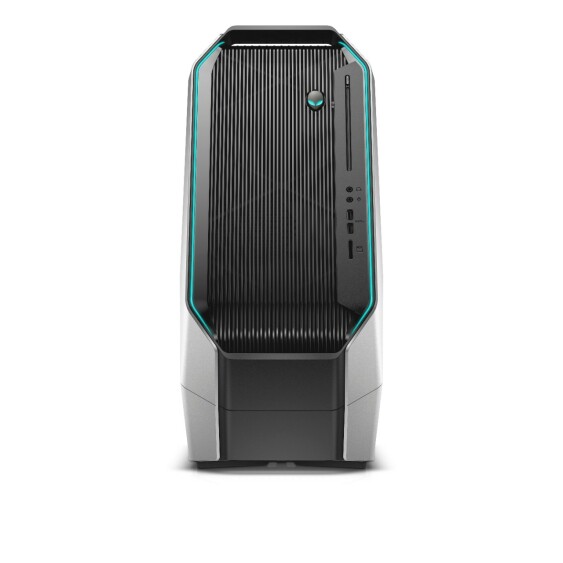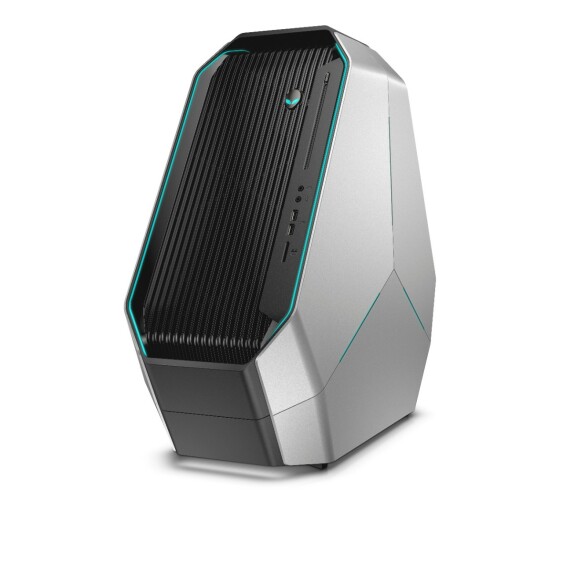Combining AMD's 16-core Ryzen Threadripper CPU with two of Nvidia's most powerful graphics cards should result in a multitasking gamer's dream PC. The Alienware Area-51 Threadripper Edition (starts at $2,399; $5,919 as tested) is well-equipped for multimedia tasks and delivers smooth 4K gameplay. It's priced and positioned as a high-end gaming desktop, wrapped in an unusual triangular tower. The issue is that it is very expensive as configured, and aside from one very specific test, it is not the fastest PC we've tested. Competitors such as the Velocity Micro Raptor Z95 and the Origin Neuron are better for multimedia projects and gaming, respectively, and the Neuron is much less expensive.

A Strong Aesthetic
The metal frame of the Area-51 Threadripper Edition is clad
in molded plastic panels. The design is the same as it was in 2015. The system
is an irregular hexagon with three short sides and three longer sides, rather
than the traditional rectangular box found in most desktop PCs. The silver
domed left and right side panels are silver, while the black plastic back and
front panels have cooling slats. In all dimensions, it dwarfs towers like the
Origin Neuron (17.8 by 9 by 15.7 inches) and Velocity Micro Raptor Z95 (17.5 by
7.25 by 20.5).
The massive Asus ROG GT51 is slightly taller, but slimmer
and shallower (23.1 by 10.31 by 23), and the blocky HP Omen X is nearly twice
as wide (20.3 by 19.9 by 16). The bottom line is that you'll have to make room
for this oddly shaped monolith. Fortunately, each corner of the chassis has a
handle to help you reposition its 62-pound mass.

The Area-51's RGB lighting can be customized in nine areas
across most of its surfaces, and the overall effect is less gaudy and
ostentatious than the MSI Aegis Ti3 (at Amazon UK). The lighting effects can be
adjusted using the Alienware Control Center utility. When you open the
left-side door, a series of lights illuminate the inside of the case, allowing
you to see the motherboard and components while tinkering, and a similar row of
lights illuminates the rear I/O ports for visibility when plugging and
unplugging cables.
Cool air enters the front of the PC, passes over internal
CPU and GPU coolers, and hot air exits the back. Even when running our
benchmark tests, the fans barely speed up to an audible level due to the
efficient airflow. It was just as quiet as the MSI Aegis Ti3, which shuts down
its fans automatically to reduce noise.

Pulling a top-mounted latch opens the left case doors. Up to
three graphics cards can be housed in the interior cavity. The motherboard has
a spare PCIe x16 slot and a PCIe x4 slot for future expansion, but I don't
think you'll need it for years (if at all). The motherboard's four DIMM slots
are all filled with 32GB of RAM, more than enough for the life of the PC.
Open the right-side door to gain access to the installed 2TB
SATA hard drive (the 1TB M.2 SSD boot drive is installed on the motherboard).
Two 3.5-inch and two 2.5-inch bays are available for additional hard drives or
SSDs. The pre-wired free drive bays are a welcome convenience for future
upgrades. Overall, its upgradeability is comparable to that of the Velocity
Micro Raptor Z95, but it has more internal expansion space than the Origin
Neuron and most other high-end gaming desktops.
There is plenty of space on the large chassis, so there is a
good selection of ports. A microphone jack, a headphone jack, an SD card slot,
and two USB 3.0 ports are located on the front panel. There's also a
slot-loading DVD drive on the front, which is unusual. On the back panel,
you'll find six DisplayPorts, two HDMI jacks, two Ethernet jacks, surround
audio ports including a S/PDIF connector, two USB 2.0 ports, one USB-C port,
and seven USB 3.0 ports.
Unfortunately, the USB-C does not support Thunderbolt 3, which would be useful when transferring videos to and from external SSDs. Wireless connections are handled by Killer-branded 802.11ac Wi-Fi and Bluetooth 4.1. After a remote diagnosis, the warranty and in-home service are valid for one year.

What Can You Make of 16 Cores?
Aside from the CPU and two Nvidia GeForce GTX 1080 Ti
graphics cards, the Area-51 I reviewed has 32GB of RAM and 3TB of storage split
between a 1TB SSD and a 2TB hard drive. The SSD, graphics cards, and processor
account for the majority of the cost. The entry-level model costs $2,699 and
includes a 12-core Ryzen Threadripper 1920X CPU, 8GB of RAM, a 2TB hard drive,
and one Nvidia GeForce GTX 1060 graphics card.
The AMD Ryzen Threadripper 1950X processor is the Area-51's
linchpin in this iteration. We installed one in a home-built PC, and Computer
Shopper describes it as "a no-brainer for serious content creators and
uncompromising multi-taskers." As a result, this desktop received our
highest-ever Cinebench score of 3,047 points. That's 657 points more than the
Velocity Micro Raptor Z95's 10-core overclocked Intel Core i7-7900X CPU and
1,973 points more than the Origin Neuron ( at Amazon UK). Animators and other
CGI artists will undoubtedly be interested in this outcome.
Similarly, our Handbrake video-encoding test took only 28 seconds, trailing only the Raptor Z95 (0:25). Any Handbrake time under a minute is excellent, and most high-end gaming PCs with Core-i7 processors will take about 45 seconds on the same test.

Other test results lagged behind the top marks: its 3,330
points on the PCMark 8 Work Conventional test trailed the Origin Neuron (4,271)
and MSI Aegis Ti3 (4,271). (4,136). Its Photoshop score was 3 minutes, 44
seconds, more than a minute and a half behind the Neuron and Digital Storm
Velox (at Amazon UK) (2:06). The latter was the most disappointing, but this was
to be expected given that Photoshop only uses a subset of the Threadripper's
cores, whereas CineBench fully utilizes the CPU's potential.
The Area-51 has two top-tier 11GB Nvidia GeForce GTX 1080 Ti
graphics cards. It can play 3D games at 4K resolution smoothly, as evidenced by
its Heaven test score of 84fps and Valley test score of 80fps. You'd expect,
nay demand, a gaming rig that costs $5,799 to compete with the best.
Unfortunately, the Origin Neuron (95fps on Heaven; 113fps on Valley) won, and
the Raptor Z95 (at Amazon UK) was also significantly ahead (88fps on Heaven;
103fps on Valley). Your eyes may not be able to distinguish between 80fps and
113fps, but your wallet will, and the price difference between these PCs is
significant.
Clearly, the Area-51 falls short as a gaming rig, but there is one group of users for whom this setup makes sense: those who want to multitask while playing games. That is exactly what this system is capable of. I hooked up a 4K and a 3K display to the Area-51 during some anecdotal testing to test its multitasking abilities. Both Heaven and Valley ran smoothly at 1080p while streaming videos from YouTube, opening a Word document, and running the Handbrake test. I had no hiccups while typing in Word, and the animation in both games remained smooth at more than 60fps throughout the session.

Massive Multitasking at a Cost
Area-51 by Alienware Threadripper Edition is certainly capable of processing multimedia tasks quickly, and you won't have to stop playing your game while your project renders in the background. I like the idea of sharing multiple tasks on a single PC, but in this case, you'll have to pay a hefty price. Those looking for multimedia performance should consider dropping one of the graphics cards to save $1,000. If gaming is more important, however, switching to a lower-priced processor pays off.
The Origin Neuron remains our Editors' Choice and primary recommendation for gaming desktops, as it performs better in 3D games and costs less than $1,900. Another option for artists, such as animators, photographers, and videographers, is the Velocity Micro Vector Z95.


